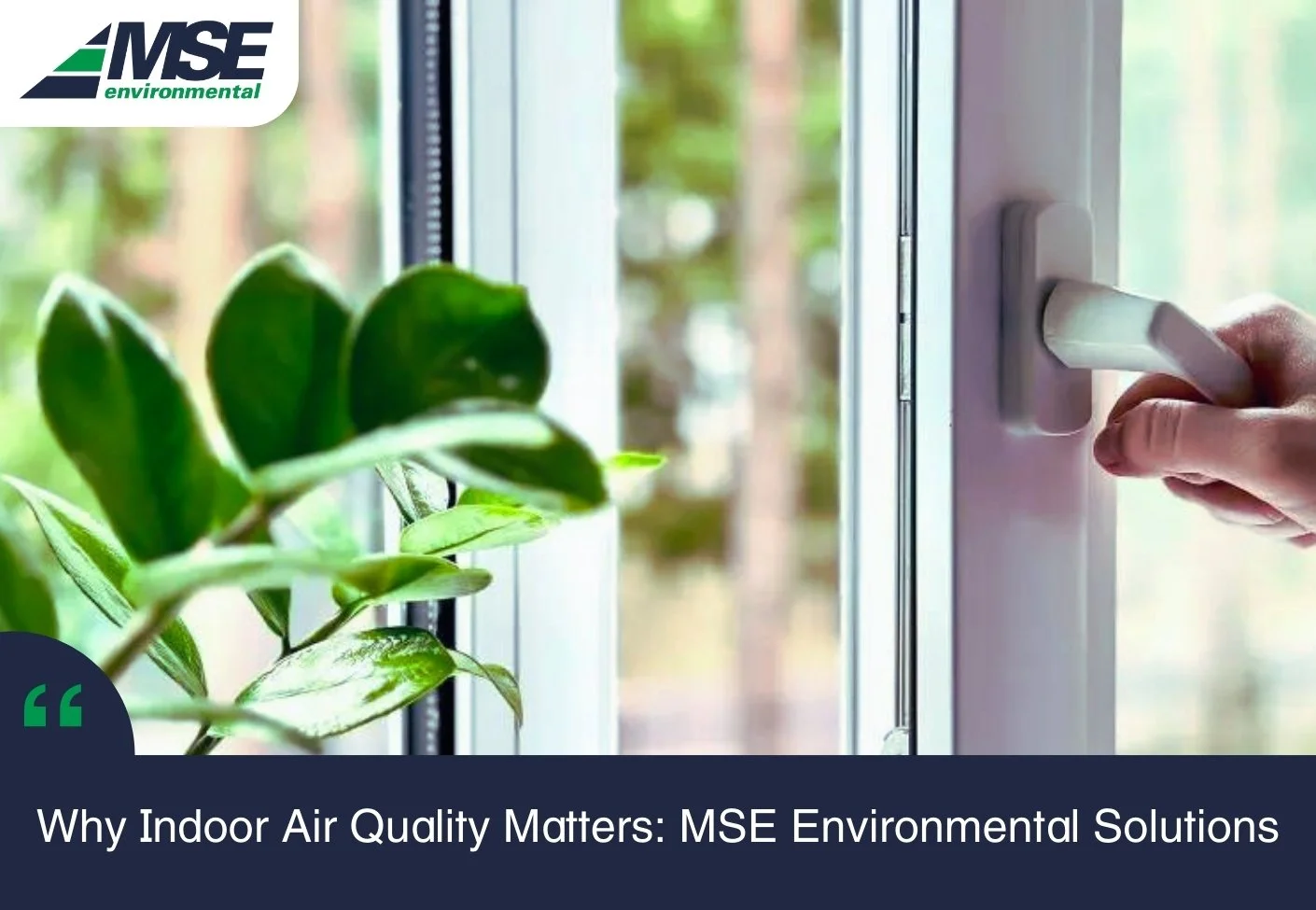Enhance indoor air quality for a better life and ease. MSE Environmental offers air quality testing and expert indoor air quality solutions for your well-being. Have you ever thought about the air you breathe indoors? It's not just about comfort; it's about your health and well-being. Indoor air quality (IAQ) is a secret treasure that can improve your life. But beware, hidden in the air are tiny enemies like pollutants, allergens, and toxins that could harm you. Don't worry; we're here to guide you on this critical journey.
Why is Indoor Air Quality Paramount?
Indoor air quality touches every part of your life and directly impacts how you feel. Poor IAQ can lead to breathing problems, allergies, and other health issues, making your life harder. But we've got good news! You can take this first step towards a healthier life right now.
Enhance indoor air quality for a better life and ease with MSE Environmental. We offer air quality testing and expert indoor air quality solutions for your well-being. Whether you need an indoor air quality monitor, air quality test, or indoor air quality services, we've got you covered. Your indoor air quality matters to us as much as it does to you. Let's create a clean, safe, healthy indoor environment together.
Understanding Indoor Air Quality
What is Indoor Air Quality (IAQ)?
Indoor Air Quality, or IAQ, is a way to measure how clean the air is inside houses and other structures. It refers to the makeup of the air and the amount of toxins, allergens, and other things that can make people sick or uncomfortable. IAQ is more than just temperature and humidity; it also includes how clean and fresh the air is.
The Importance of IAQ in Homes and Businesses
Indoor air quality is essential at home and work. It's an integral part of a healthy and valuable setting. Knowing that the air we breathe inside can significantly affect our health is essential.
Health: Your health needs to breathe clean air. Poor IAQ can make breathing problems worse, make allergies worse, and even cause more serious health problems.
Productivity: The air quality inside a business building directly affects workers' productivity. Good indoor air quality (IAQ) can help you focus and think more clearly, while bad IAQ can make you tired and less productive.
Comfort: Comfort is essential at home. Clean air makes your home more pleasant, making you and your family feel at ease.
Common Causes of Poor IAQ
Recognizing the common factors responsible for diminished indoor air quality (IAQ) is essential for effectively tackling this problem. Below are some of the primary culprits that can lead to IAQ concerns:
Mold and Moisture:
Accumulating mold and excess moisture in indoor spaces can trigger respiratory issues and allergies, making addressing and preventing them crucial.
Asbestos:
When disturbed, asbestos-containing materials release harmful fibers into the air, leading to severe respiratory problems. Identifying and managing asbestos is crucial for IAQ.
Lead (in Paints):
When deteriorating or disturbed, lead-based paints can release toxic lead dust particles into the air, posing significant health risks, particularly to pregnant women and children.
Wildfire Soot:
Wildfire soot contains fine particulate matter and harmful chemicals that can infiltrate indoor environments, affecting air quality and posing health concerns.
Radon:
Radon is an inodorous and colorless gas that can percolate into buildings from the ground, potentially leading to lung cancer if levels are elevated. Regular testing is essential to mitigate radon-related IAQ issues.
Legionella:
Legionella bacteria, often found in water systems like cooling towers and plumbing, can become airborne and cause a severe respiratory illness known as Legionnaires' disease. Proper water system maintenance is vital.
Silica:
Dust containing crystalline silica, commonly found in construction and manufacturing settings, can become airborne and pose respiratory hazards. Effective dust control measures are essential for IAQ.
Water Damage:
Prolonged water damage can foster mold growth, create a damp environment, and deteriorate building materials that promote poor IAQ. Timely water damage remediation is vital.
Sewage:
Sewage leaks or backups can introduce harmful pathogens and contaminants into indoor spaces, severely impacting IAQ and posing health risks.
Bird Droppings:
Accumulation of bird droppings can release airborne allergens and pathogens, potentially causing respiratory issues and other health concerns.
Things You Should Do to Combat Poor IAQ
Air Quality Testing: Regular air quality testing is essential to identify pollutants and contaminants. Testing helps pinpoint issues that may not be apparent to the naked eye, ensuring your IAQ remains within acceptable standards.
Indoor Air Quality Monitor: Getting an indoor air quality monitor can give you real-time data about the air quality. These tools can find pollutants like VOCs, particulate matter, and carbon dioxide so that you can deal with them immediately.
Indoor Air Quality Standards: Complying with indoor air quality standards is crucial, especially for businesses. These standards are in place to protect the health and well-being of occupants, and adherence to them is not only a legal requirement but also a moral obligation.
The Impact of Poor Indoor Air Quality
Health Implications of Breathing Polluted Indoor Air
Breathing clean, fresh air should be a given, but when indoor air quality (IAQ) is compromised, it can lead to various health problems. Here are some health implications of inhaling polluted indoor air:
Respiratory Issues: Having bad IAQ can make allergies and asthma worse. Pollutants like mold spores, dust, and pet dander can hurt the lungs and make you cough, sneeze, and have trouble breathing.
Aggravated Allergies: If you suffer from allergies, poor IAQ can make your symptoms worse. Airborne allergens can linger indoors, leading to persistent discomfort.
Headaches and Fatigue: Pollutants in the air can give you headaches, make you tired, and make you feel sick. These signs can make it hard to do things and have an everyday life.
Impact on Productivity and Daily Life
Indoor air quality isn't just about health; it directly impacts how we function daily, whether at home or in the workplace. Here's how poor IAQ can affect productivity and overall well-being:
Reduced Concentration: When indoor air is laden with pollutants, concentrating and staying focused can be more challenging. This is particularly crucial in a work environment where productivity is critical.
Discomfort: A workspace or home with poor IAQ can lead to discomfort. Employees may feel less motivated, and family members may experience a reduced quality of life.
Increased Sick Days: Poor IAQ can lead to increased sick days at home and work. This not only affects individual health but also impacts overall productivity and efficiency.
The Financial Burden of Health Issues
The repercussions of poor IAQ go beyond health and comfort; they can hit your wallet hard. Here's how health issues related to poor IAQ can lead to a significant financial burden:
Medical Expenses: Seeking treatment for respiratory problems and allergies can result in substantial medical bills. Medications, doctor's visits, and hospital stays can increase over time.
Lost Productivity: In a business setting, employees' health issues due to poor IAQ can lead to decreased productivity and increased absenteeism. This can affect a company's bottom line.
Home Remediation: If your home's IAQ has been compromised, you may need to invest in costly remediation measures to address mold or other air quality issues.
Prevention Measures
A. Steps to Improve Indoor Air Quality in Homes and Businesses
Improving indoor air quality (IAQ) is a must for making places to live and work healthy and more comfortable. Let's dive into some practical, step-by-step measures you can take to enhance IAQ:
Proper Ventilation Techniques:
Proper ventilation is crucial for maintaining clean indoor air. Here's what you can do:
Open Windows: Whenever weather permits, open windows to let in fresh outdoor air. This can help flush out indoor pollutants.
Use Exhaust Fans: The exhaust fans from the kitchen and bathroom will eliminate moisture and odors. Ensure they are working efficiently.
Invest in Air Purifiers: Consider using HEPA filters to remove particles and allergens from the air.
Humidity plays a significant role in IAQ. How to manage it effectively:
Use Dehumidifiers: In areas with excessive humidity, such as basements, use dehumidifiers to maintain optimal moisture levels.
Monitor Humidity: Invest in a hygrometer to monitor humidity levels. Aim for indoor humidity between 30% and 50%.
Minimizing Indoor Pollutants:
To reduce indoor pollutants, take these measures:
Regular Cleaning: Dust, vacuum, and mop regularly to minimize dust, pet dander, and other allergens.
No Smoking Indoors: Strictly prohibit smoking indoors to prevent tobacco smoke from compromising IAQ.
Address Mold Issues: If you detect mold or mildew, promptly address the issue to prevent it from spreading.
Limit VOCs: Choose low-VOC (volatile organic compound) or VOC-free products for painting, cleaning, and furnishing.
B. Importance of Regular Air Quality Testing
Maintaining good IAQ is ongoing, and regular air quality testing is critical. Here's why it's crucial:
Identifying Issues: Air quality testing can pinpoint specific pollutants and contaminants that may be present in your indoor environment. This information is crucial for taking targeted corrective actions.
Assessment and Improvement: Testing allows you to assess the effectiveness of your IAQ improvement measures. If IAQ standards are not met, you can adjust your strategies accordingly.
Compliance with Standards: Regular testing ensures that your indoor environment complies with indoor air quality standards set by regulatory bodies, safeguarding the health of occupants.
Role of MSE Environmental
A. Dependable MSE Environmental
When ensuring top-notch indoor air quality (IAQ), having the right partner on your side can make all the difference. That's where MSE Environmental comes into play. MSE Environmental is a leading testing, inspection, and consultation company with a sterling reputation for excellence. Let's explore how MSE Environmental can be your trusted ally in seeking cleaner, healthier indoor air.
B. MSE Environmental's Services for Enhanced IAQ
MSE Environmental offers a comprehensive suite of services dedicated to improving IAQ in residential and commercial settings. Here's a glimpse of what they bring:
Air Quality Testing: MSE Environmental specializes in thorough air quality testing. Their expert team uses state-of-the-art equipment to identify and quantify pollutants, ensuring you understand your indoor environment clearly.
Consultation and Analysis: MSE Environmental provides invaluable consultation services beyond testing. They analyze the test results, offering insights and recommendations tailored to your IAQ needs.
Custom Solutions: Recognizing that each IAQ challenge is unique, MSE Environmental develops custom solutions to address issues effectively. Whether it's ventilation improvements, mold remediation, or VOC reduction, they have you covered.
C. Adherence to Government Regulations
MSE Environmental is not just a testing company dedicated to ensuring that your indoor environment meets and exceeds government regulations. They are well-versed in the guidelines established by key regulatory bodies, such as:
This commitment to compliance ensures that your IAQ efforts align with the highest safety and health standards.
MSE Environmental's expertise in indoor air quality services and its strict adherence to U.S. government regulations make it a trusted partner in creating healthier, safer indoor environments. Regarding IAQ, they are your go-to source for expert guidance and solutions.
What have we learned?
This comprehensive guide explored the critical aspects of indoor air quality (IAQ) in homes and businesses. Let's take a moment to summarize the key points and underscore the paramount importance of improving IAQ for the well-being of all occupants.
A Clean Start for Indoor Air Quality
We defined IAQ and understood its significance. Indoor air quality is not a minor concern; the air we breathe impacts our health and quality of life. It encompasses proper ventilation, humidity control, and reducing indoor pollutants.
The Profound Impact of Poor IAQ
We delved into the health implications of breathing polluted indoor air, highlighting respiratory problems, allergies, and discomfort risks. Poor IAQ doesn't stop at health; it can affect productivity and daily life, leading to reduced concentration and increased sick days. Moreover, medical expenses and lost productivity can result in a substantial financial burden.
Taking Action: Prevention Measures
We discussed practical prevention measures to address poor IAQ. Proper ventilation techniques, humidity level maintenance, and minimizing indoor pollutants are the keys to cleaner indoor air. Regular air quality testing emerged as vital in maintaining and improving IAQ.
The Role of MSE Environmental
We introduced MSE Environmental as a trusted partner to better IAQ. They offer various services, including air quality testing, consultation, and customized solutions. Their unwavering commitment to U.S. government regulations ensures that your IAQ efforts meet the highest standards.
A Call to Prioritize IAQ
It is essential to prioritize IAQ in both homes and businesses. Clean, healthy air should be a fundamental right, not a luxury. Improving IAQ is an investment in our health, happiness, and well-being because we spend so much time indoors.
In the quest for cleaner indoor air, remember that MSE Environmental is here to assist you every step of the way. Whether testing, consultation, or tailored solutions, they have the expertise to ensure your indoor environment meets the highest IAQ standards.
Improve your surroundings' IAQ today and breathe easier knowing you've taken a big step toward a healthier life for yourself, your family, and your employees.
Now that you've gained valuable insights into indoor air quality (IAQ) and the steps to enhance it, it's time to take action. Your journey to cleaner, healthier indoor air begins here.
Elevate your daily air quality with expert advice, thorough testing, and insightful consultations from MSE ENVIRONMENTAL. Take the first step towards a healthier indoor environment. Contact us at (888) 258-3860 or email us at info@msenational.com to begin your journey to improved air quality.








Discover the future trends in indoor air quality with cutting-edge IAQ solutions, IAQ monitoring, and management trends for healthier, smarter spaces.